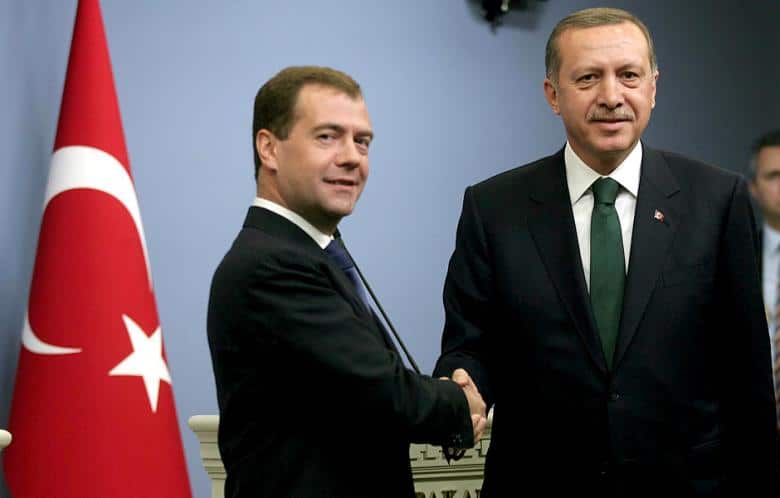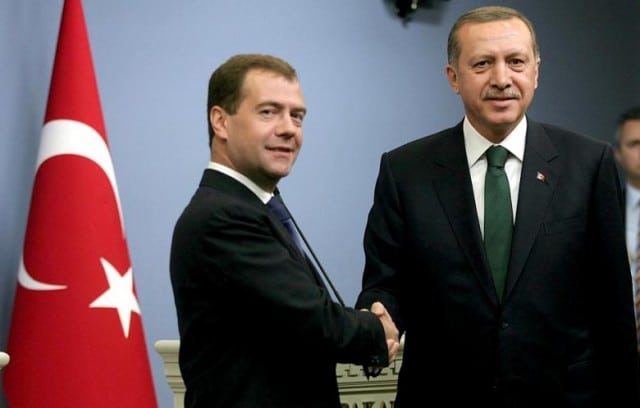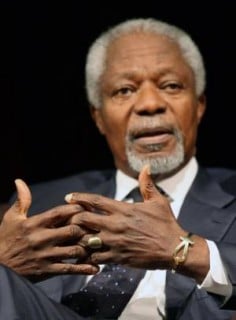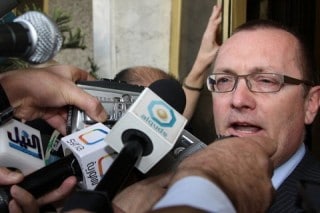
Although Turkey has backtracked from its belligerent public posture, there are still elements in the country that remain rigid on Syria. The same is true for the US and France. The fact that 2012 is an important election year in both countries plays a part in the strategy shuffle, but there are other pressing concerns too.
by Sharmine Narwani

In recent weeks, there has been a notable shuffle in the positions of key external players in the Syrian crisis. Momentum has quite suddenly shifted from an all-out onslaught against the Assad government to a quiet investigation of exit strategies.
The clashes between government forces and opposition militias in Baba Amr were a clear tipping point for these players – much hinged on the outcome of that battle. Today, the retreat of armed groups from the Homs neighborhood means one thing: the strategy of militarizing the conflict from within is no longer a plausible option on which to hang this geopolitical battle. Especially not in an American or French election year, when anything less than regime change in Syria will look like abject failure.
And so the external players are shifting gears – the more outspoken ones, quietly seeking alternative options. There are two de facto groups that have formed. Group A is looking for a face-saving exit from the promised escalation in Syria. It consists of the United States, European Union and Turkey. Group B, on the other hand, is heavily invested in regime-change at any cost, and includes Saudi Arabia, Qatar, and some elements of the French, US, British, and Libyan establishments.
Before Baba Amr, these two groups were unified in maximizing their every resource to force regime change in Syria. When the UN Security Council option was blocked by Russia and China, they coalesced around the General Assembly and ad-hoc “Friends of Syria” to build coalitions, tried unsuccessfully to bring a disparate opposition fighting force (Free Syrian Army) under central leadership, pushed to recognize the disunited Syrian National Council (SNA), and eked out weekly “events” like embassy closures and political condemnations to maintain a “perception momentum.”
But those efforts have largely come to a standstill after Baba Amr. A reliable source close to the Syrian regime said to me recently: “The regime eliminated the biggest and most difficult obstacle – Baba Amr. Elsewhere, it [eliminating armed militias] is easier and less costly at all levels. Now both political and military steps can continue.”
Dealmaking Begins in Earnest

The first clear-cut public sign of this new phase was the appointment of Kofi Annan as UN envoy to Syria. Annan is an American “concession” that will draw out this dealmaking phase between the Syrian government, opposition figures and foreign governments potentially until the May 2012 parliamentary elections.
This phase is what the Russians, Chinese, Iranians, and other BRIC countries have sought from the start: the creation of a protective bubble around Syria so that it has the time and space necessary to implement domestic reforms that will not harm its geopolitical priorities.
Syria threatens to blast open a Pandora’s Box of newly-motivated “soldiers of God.” And while sectarian anger may be the fuse, the conflagration will take place on a major geopolitical fault line in the Mideast, at a delicate time, on one of Israel’s borders.
Dealmaking and dialogue can be seen everywhere suddenly. Annan is only a figurehead masking these multilateral efforts. Reports are coming in that the US has kept a steady dialogue with the Syrian regime throughout. Opposition religious figures – mostly Muslim Brotherhood in their day-job guises – have met with the regime in recent weeks. And prominent Syrian reformists who reject military action and are open to dialogue with the regime, are now being sought out by various European governments.The European Union (EU) kicked things off in March in a joint foreign ministerial communique rejecting military intervention in Syria. This was swiftly followed by Kofi Annan’s strong warning against external efforts to arm the Syrian opposition, with various Americans making similar soundings in his wake.
One very prominent Syrian reformist who has remained engaged with both sides of this conflict, confided that the externally-based Syrian opposition are now “looking over each other’s shoulders – none yet dares to speak out.” The fact is, says the source, “they are getting military assistance, but nowhere near enough. They need much, much more that what they are getting, and now the countries backing this opposition are developing conflicting agendas.”
Three high-level defections from the opposition Syrian National Council (SNC) were announced within days of that conversation, hinting further at the fundamental policy shifts occurring in all circles, behind the scenes.
The game has changed along Syria’s borders too. Turkey, a ferocious critic of the Assad government this past year, is reconsidering its priorities. A participant in a recent closed meeting with Turkish Foreign Minister Ahmet Davutoglu reveals the emptiness of Turkish threats to form a “humanitarian corridor” or security zone on their Syrian border.
Davutoglu, says my source, insisted in private that “Turkey will not do anything to harm Syria’s territorial integrity and unity because that will transfer the conflict into Turkish territory.”
Recent deliberations with Iran also seem to have resonated with the Turks. During Foreign Minister Ali Akbar Salehi’s January visit to Ankara, a source tells me that an understanding was reached. The Iranian FM is said to have warned Turkish leaders that they were leveraging a lot of goodwill – painstakingly built up in the Muslim/Arab world – in return for “no clear benefit” in Syria. According to my source, the Turks were encouraged to strike a bargain to regain their regional standing – the key concession being that Assad would stay through the reform period.
A Hard Dose of Realpolitik
Although Turkey has backtracked from its belligerent public posture, there are still elements in the country that remain rigid on Syria. The same is true for the US and France. The fact that 2012 is an important election year in both countries plays a part in the strategy shuffle, but there are other pressing concerns too.
One major worry is that there aren’t a lot of arrows left in the quiver to fire at Syria. Without the UN Security Council granting legal authority to launch an offensive against Syria, there are only piecemeal efforts – and these have all been tried, if not yet exhausted: sanctions, demonstrations, arming militias, cyberwarfare, propaganda, diplomatic arm-twisting, and bribing defectors. But a whole year has passed with no major cracks in support from the regime’s key constituencies and that has caused some debate about whether this kind of tactical pressure may ultimately backfire.
In Washington in particular, alarm bells have been ringing since militant Islamists infiltrated the Syrian opposition militias, some pouring in from Iraq where they were only recently targeting American interests. The US has spent the better part of a decade focusing its national security apparatus on the threat from Al Qaeda and militant Islam. The execution of Osama Bin Laden and other Al Qaeda-related figures was meant to put a seal on this problem – at least in the sense that the organization has shriveled in size and influence.
But Syria threatens to blast open a Pandora’s Box of newly-motivated “soldiers of God.” And while sectarian anger may be the fuse, the conflagration will take place on a major geopolitical fault line in the Mideast, at a delicate time, on one of Israel’s borders – and changing winds could fan those flames right back in the direction of the United States and its allies.

That is a red line for the US military and a sizeable chunk of the Washington political establishment. There are other Americans, however, who are unable to view the Syrian crisis outside the prism of Iran and its growing regional influence. US Assistant Secretary of State Jeffrey Feltman, who has spent years now orchestrating the defeat of the Iran-led “Resistance Axis,” is one such player in the capital.
Feltman is part of Group B, alongside Qatar and Saudi Arabia. The battle in Syria has become an existential one for Group B. They have played too hard and revealed too much, to be able to re-assert themselves into any impartial regional role in the future – unless there is a changing of the guard in Syria.
As Group A moves toward a face-saving exit from the crisis, we are going to witness a re-telling of events in Syria. The Western “mainstream media” and major international NGOs, which have served as little more than propaganda tools for various governments seeking to escalate the Syrian crisis and vilify the Assad government, are suddenly “discovering” dangerous elements in the Syrian opposition. This scene-setting is just as deliberate as the false narratives we have witnessed from Group A since the start of the crisis.
Group B, on the other hand, remains unable to take its eye off the Syrian brass ring and may continue to employ increasingly brazen and foolhardy tactics to stimulate chaos inside the country. Syria may be Group B’s graveyard unless they are brought into these deals and promised some protection. I suspect, however, that they will instead be utilized as a valuable negotiating tool for Group A – brought into play if dealmaking is not working to their advantage.
While negotiations plod on over Syria, we can be assured that most external players have little or no consideration for actual Syrians. The regime will be focused on the long haul, which includes ridding the country of armed groups, ensuring that major roadways are free of IEDs and snipers, implementing a watered-down reform program with token opposition members to give lip service to progress, and becoming even more entrenched in the face of regional and foreign threats.
Meanwhile, the West and its regional allies will happily draw out a low-boil War of Attrition in Syria to keep the Syrian regime busy, weakened and defensive, while further seeking to cement their hold on the direction of the “Arab Spring.” They will pull levers to create flare-ups when distractions or punishments are warranted, with nary a care to the lives and livelihoods of the most disenfranchised Syrians whose blood is this conflict’s main currency.
It will never be certain if there was a revolution in Syria in 2011. The country became a geopolitical battleground less than a month after the first small protests broke out in various pockets inside Syria. And it is not over by a long stretch. Syria will continue to be the scene of conflict between two regional blocs until one side wins. This may be a new phase in Syria today where players are converging to “cut some losses,” but be assured that they are merely replenishing and repositioning their reserves for a broader regional fight.
Original source: english.al-akhbar.com
Sharmine Narwani is a commentary writer and political analyst covering the Middle East. You can follow Sharmine on twitter @snarwani.
ATTENTION READERS
We See The World From All Sides and Want YOU To Be Fully InformedIn fact, intentional disinformation is a disgraceful scourge in media today. So to assuage any possible errant incorrect information posted herein, we strongly encourage you to seek corroboration from other non-VT sources before forming an educated opinion.
About VT - Policies & Disclosures - Comment Policy



